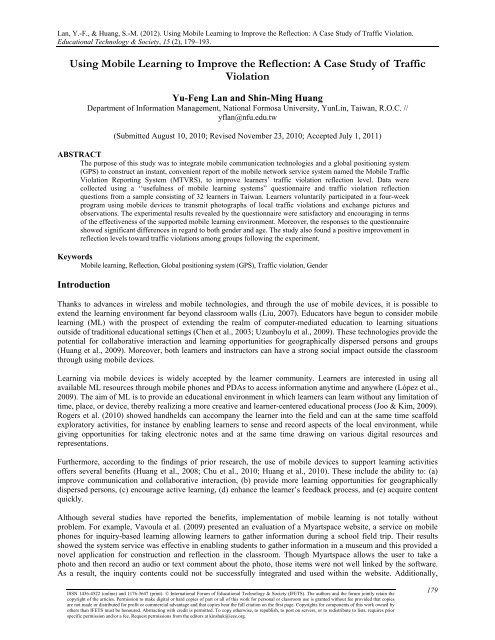April 2012 Volume 15 Number 2 - Educational Technology & Society
April 2012 Volume 15 Number 2 - Educational Technology & Society
April 2012 Volume 15 Number 2 - Educational Technology & Society
You also want an ePaper? Increase the reach of your titles
YUMPU automatically turns print PDFs into web optimized ePapers that Google loves.
Lan, Y.-F., & Huang, S.-M. (<strong>2012</strong>). Using Mobile Learning to Improve the Reflection: A Case Study of Traffic Violation.<br />
<strong>Educational</strong> <strong>Technology</strong> & <strong>Society</strong>, <strong>15</strong> (2), 179–193.<br />
Using Mobile Learning to Improve the Reflection: A Case Study of Traffic<br />
Violation<br />
Yu-Feng Lan and Shin-Ming Huang<br />
Department of Information Management, National Formosa University, YunLin, Taiwan, R.O.C. //<br />
yflan@nfu.edu.tw<br />
(Submitted August 10, 2010; Revised November 23, 2010; Accepted July 1, 2011)<br />
ABSTRACT<br />
The purpose of this study was to integrate mobile communication technologies and a global positioning system<br />
(GPS) to construct an instant, convenient report of the mobile network service system named the Mobile Traffic<br />
Violation Reporting System (MTVRS), to improve learners’ traffic violation reflection level. Data were<br />
collected using a ‘‘usefulness of mobile learning systems” questionnaire and traffic violation reflection<br />
questions from a sample consisting of 32 learners in Taiwan. Learners voluntarily participated in a four-week<br />
program using mobile devices to transmit photographs of local traffic violations and exchange pictures and<br />
observations. The experimental results revealed by the questionnaire were satisfactory and encouraging in terms<br />
of the effectiveness of the supported mobile learning environment. Moreover, the responses to the questionnaire<br />
showed significant differences in regard to both gender and age. The study also found a positive improvement in<br />
reflection levels toward traffic violations among groups following the experiment.<br />
Keywords<br />
Mobile learning, Reflection, Global positioning system (GPS), Traffic violation, Gender<br />
Introduction<br />
Thanks to advances in wireless and mobile technologies, and through the use of mobile devices, it is possible to<br />
extend the learning environment far beyond classroom walls (Liu, 2007). Educators have begun to consider mobile<br />
learning (ML) with the prospect of extending the realm of computer-mediated education to learning situations<br />
outside of traditional educational settings (Chen et al., 2003; Uzunboylu et al., 2009). These technologies provide the<br />
potential for collaborative interaction and learning opportunities for geographically dispersed persons and groups<br />
(Huang et al., 2009). Moreover, both learners and instructors can have a strong social impact outside the classroom<br />
through using mobile devices.<br />
Learning via mobile devices is widely accepted by the learner community. Learners are interested in using all<br />
available ML resources through mobile phones and PDAs to access information anytime and anywhere (López et al.,<br />
2009). The aim of ML is to provide an educational environment in which learners can learn without any limitation of<br />
time, place, or device, thereby realizing a more creative and learner-centered educational process (Joo & Kim, 2009).<br />
Rogers et al. (2010) showed handhelds can accompany the learner into the field and can at the same time scaffold<br />
exploratory activities, for instance by enabling learners to sense and record aspects of the local environment, while<br />
giving opportunities for taking electronic notes and at the same time drawing on various digital resources and<br />
representations.<br />
Furthermore, according to the findings of prior research, the use of mobile devices to support learning activities<br />
offers several benefits (Huang et al., 2008; Chu et al., 2010; Huang et al., 2010). These include the ability to: (a)<br />
improve communication and collaborative interaction, (b) provide more learning opportunities for geographically<br />
dispersed persons, (c) encourage active learning, (d) enhance the learner’s feedback process, and (e) acquire content<br />
quickly.<br />
Although several studies have reported the benefits, implementation of mobile learning is not totally without<br />
problem. For example, Vavoula et al. (2009) presented an evaluation of a Myartspace website, a service on mobile<br />
phones for inquiry-based learning allowing learners to gather information during a school field trip. Their results<br />
showed the system service was effective in enabling students to gather information in a museum and this provided a<br />
novel application for construction and reflection in the classroom. Though Myartspace allows the user to take a<br />
photo and then record an audio or text comment about the photo, those items were not well linked by the software.<br />
As a result, the inquiry contents could not be successfully integrated and used within the website. Additionally,<br />
ISSN 1436-4522 (online) and 1176-3647 (print). © International Forum of <strong>Educational</strong> <strong>Technology</strong> & <strong>Society</strong> (IFETS). The authors and the forum jointly retain the<br />
copyright of the articles. Permission to make digital or hard copies of part or all of this work for personal or classroom use is granted without fee provided that copies<br />
are not made or distributed for profit or commercial advantage and that copies bear the full citation on the first page. Copyrights for components of this work owned by<br />
others than IFETS must be honoured. Abstracting with credit is permitted. To copy otherwise, to republish, to post on servers, or to redistribute to lists, requires prior<br />
specific permission and/or a fee. Request permissions from the editors at kinshuk@ieee.org.<br />
179

















